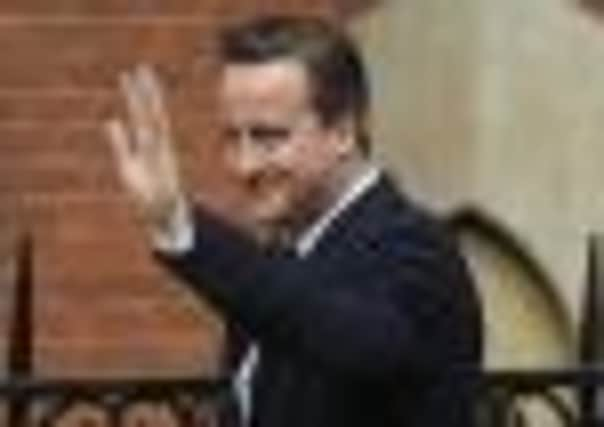Leveson inquiry: The gushing text Rebekah Brooks sent to David Cameron


• Cameron admitted decision to employ former News of the World editor Andy Coulson had “haunted” him
• Prime Minister quized over close relationship with News International director Rebekah Brooks
Advertisement
Hide AdAdvertisement
Hide AdIn a day-long test, Mr Cameron was forced to explain the embarrassing private text from the former chief executive who told him prior to his conference speech in 2009 that she was “rooting” for him as a “proud friend”.


During the lunch-break in the evidence session yesterday, Mr Cameron had to rely on his wife, Samantha, to check how many times the couple had met up with Brooks and her husband, Charlie Brooks, who were their neighbours in their weekend homes.
Mr Cameron, however, insisted it was “absolute nonsense” to suggest, as claimed by Gordon Brown, that News International (NI) chiefs such as Brooks had bought favours from the Conservatives in return for their friendship and the support of the Sun newspaper.
In evidence yesterday, it emerged that NI chairman James Murdoch had met Mr Cameron to inform him that the Sun would be backing the Conservatives prior to the last election.
Again, Mr Cameron said the subject of the company’s business interests had not arisen at the same time.


He conceded he was “haunted” by the decision to hire former News of the World editor Andy Coulson as his director of communications, given the revelations about phone hacking at the paper while he was in charge.
Mr Cameron also faced lengthy questioning about why he put Culture Secretary Jeremy Hunt in charge of handling NI’s attempted takeover of BSkyB in what the inquiry suggested was a hurried process.
Mr Hunt had written earlier to Mr Cameron expressing his fervent backing for the deal, but the Prime Minister claimed yesterday that, when deciding to appoint Mr Hunt, he had forgotten about the memo.
Advertisement
Hide AdAdvertisement
Hide AdThe wide array of questioning made it a gruelling day for the Prime Minister, who had decided that the Leveson Inquiry should be set up last year, when he could not have predicted the difficulties it has subsequently caused his administration.
Brooks, who appeared in court on Wednesday on charges related to phone hacking, had previously embarrassed the Prime Minister at an earlier session by revealing their habit of texting one another, noting he had signed off messages “LoL”, which he thought meant “lots of love”. In fact, it means “laugh out loud”.
Yesterday, the inquiry published a text Brooks sent to Mr Cameron at the Tory conference in 2009, on the eve of his platform speech, the last before he was elected Prime Minister.
Expressing disappointment that he had not appeared at a party organised by the Times, Brooks added: “I’m so rooting for you tomorrow not just as a proud friend but because professionally we are in this together. Speech of your life? Yes he Cam!”
Asked for his thoughts on the text, Mr Cameron replied: “The Sun wanted to make sure it was helping the Conservative Party put its best foot forward with the policies we were announcing, the speech I was making. That’s what that means. We were friends. But professionally, me as leader of the Conservative Party, her in newspapers, we were going to be pushing the same political agenda.”
Asked about how often they met or spoke to the Brooks, Mr Cameron replied: “I do not think every weekend, I do not think most weekends. But it would depend.”
Correcting his evidence after the lunch break, he said his wife had kept a better diary, showing that “we probably did not see them more than once every six weeks”.
But Mr Cameron said he rejected entirely that his closeness to NI executives led to any deal taking place between him and the company, as alleged by Mr Brown.
Advertisement
Hide AdAdvertisement
Hide AdSpeaking earlier in the week, Mr Cameron’s predecessor had claimed that there had been a deal to cut funding to the BBC and media regulator Ofcom in return for NI’s support.
Yesterday, Mr Cameron said of Mr Brown’s claims: “He has cooked up a specious and unjustified conspiracy theory to justify his anger. There had been neither overt deals, covert deals, and no ‘nods and winks’ and no question of ‘trading policies for that support’.”
In exchanges with inquiry QC Robert Jay, Mr Cameron was asked about his decision-making processes concerning the media giant and his hiring of Coulson.
Mr Cameron said his “recollection” was that he had asked Coulson whether he knew about the phone hacking at the paper in a face-to-face interview with him prior to his appointment. This contradicts evidence by Coulson to the inquiry, that Mr Cameron had only asked about it in a subsequent phone conversation.
Mr Cameron told the inquiry he accepted Coulson was “a controversial appointment” which had been opposed by some MPs in his party. He added: “This has come back to haunt both him [Coulson] and me.”
On the question of press regulation, Mr Cameron said he thought that a new independent regulator should be created, but that statutory controls should be resisted as far as possible